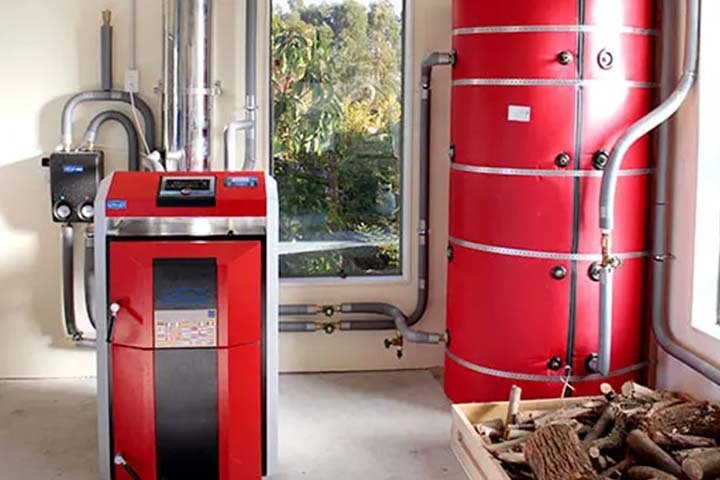Table of Contents
Getting rid of high energy costs and still heating your home without damaging the planet has become significantly difficult for UK households. However, Biomass heating systems has been really underrated in this scenario as they help in all three scenarios.
Biomass heating systems burn wood pellets instead of gas/oil or any damaging fuel. We will be discussing the feasibility of biomass heating systems, including the wood pellet costs and benefits as compared to traditional heating methods.
What is a Biomass Heating System?
As per the simplest definition, instead of burning gas, if your boiler burns wood, that would be called a biomass heating system. A biomass boiler uses wood in different forms, like pellets, logs, or wood chips. The heat produced by wood heats the water, which then circulates around the home to provide hot water and heating.
The fact why this system is amazing is that it uses renewable energy sources, costs less, and doesn’t damage the environment. Modern biomass heating systems work just like regular boilers, providing heat, hot water, and working with existing radiators.
Air Source Heat Pump Grants
How Does a Biomass Boiler Work?
Ever wonder what happens inside these things? It’s pretty simple, really. First, you store your fuel nearby. This might be wood pellets, logs, or wood chips. The boiler takes this fuel and burns it in a special chamber.
The burning creates heat. This heat warms up water in a heat exchanger. Hot water then flows through your central heating system. Boom. Your house gets warm.
What about the ash? Don’t worry. The system collects it automatically. You just empty a tray a few times per year. Easy.
Many systems also have something called a buffer tank. This stores extra heat. It makes everything run smoother. Your biomass heating system stays efficient even when you don’t need much heat.
Types of Biomass Fuel: What Should You Pick?
Not sure which fuel to choose? Let’s break it down.
1. Wood Pellet: Super Convenient
Wood pellets are tiny compressed bits of sawdust. They’re like wood candy. Why are they great? They’re really dry. Less than 10% water content. That means they burn really well. They’re also the same size. This makes them perfect for automatic feeding systems.
A pellet boiler can feed itself. You just need to fill up the storage every so often. No daily wood carrying for you. The downside? Wood pellets cost more than other options. But many folks think the convenience is worth it.
2. Wood Chips: Save Some Money
Want cheaper fuel? Wood chips might be your answer. These are bigger chunks of wood. They cost less than pellets. Great for bigger homes that need lots of heat.
But here’s the catch. You need more space to store them. They also have more water in them. This can make them less efficient than pellets. Wood chip boilers work best for large homes or commercial buildings.
3. Logs: Old School and Cheap
Logs are the classic choice. They’re usually the cheapest biomass fuel you can get. But there’s work involved. You need to load them by hand. No automatic feeding here.
You also need to dry them for at least a year before using them. Log boilers are perfect if you don’t mind the extra work. They’re great for smaller homes, too.
Benefits of Biomass Heating: Why Make the Switch?
So why should you care about biomass heating? Let me count the ways.
1. Help Save the Planet
Here’s something amazing. When you burn wood, you’re not really adding CO2 to the air. Why? Because the tree absorbed that same CO2 when it was growing.
It’s like nature’s perfect recycling system. Compare this to burning gas or oil. Those fossil fuels add new CO2 to the atmosphere.
Want to cut your carbon footprint? A biomass heating system can reduce your heating emissions by up to 95%. That’s huge.
2. Save Money Long-Term
Yes, biomass boilers cost more upfront. But they can save you money over time. Biomass fuel is usually cheaper than gas or oil per unit of heat. The prices are also more stable. No more worrying about oil price spikes.
Plus, you might get help with the cost. The government offers up to £5,000 through the Boiler Upgrade Scheme. Not bad, right?
3. Work With Your Existing System
Good news. Most biomass boilers work with your current central heating setup. Got radiators? They’ll work. Underfloor heating? That works too.
You don’t need to rip out your whole heating system. The biomass boiler just replaces your old gas or oil boiler. Modern biomass heating systems are also really reliable. They can run for years with proper care.
Any Downsides? Let's Be Honest
Nothing’s perfect. What are the challenges with biomass heating?
1. You Need Space
This is the big one. Biomass systems need room. Lots of it. You need space for the boiler. You need space for fuel storage. You also need access for fuel deliveries. Live in a small flat? This probably isn’t for you. Got a big house with outbuildings? Perfect.
2. Higher Upfront Costs
Let’s talk about money. Biomass boilers cost more than regular boilers. A lot more. You might pay £6,000 to £35,000, depending on what you get.
That’s compared to £2,000 to £3,000 for a gas boiler. But remember the long-term savings. And those government grants can help too.
3. More Maintenance
Biomass boilers need more care than gas boilers. You’ll need to:
- Empty ashtrays regularly
- Clean the system more often
- Have annual services
Are you okay with this extra work? Some people love being more involved. Others find it annoying.
Cost of a Biomass Boiler: The Real Numbers
Let’s get specific about costs. What will you actually pay?
1. Buying and Installing
Here’s what different systems cost:
- Log boilers: £6,000 to £12,000
- Manual wood chip systems: £10,000 to £16,000
- Automatic wood chip systems: £15,000 to £25,000
- Manual pellet boilers: £15,000 to £25,000
- Automatic pellet boilers: £20,000 to £35,000
Don’t forget the installation. That’s another £3,000 to £8,000.
Sounds expensive? Remember, you might get £5,000 back from the government.
2. Running Costs
What about fuel? Here are the current prices:
- Wood pellet: £300 to £500 per ton
- Wood chips: £300 to £600 per ton
- Logs: £200 to £400 per ton
Most homes spend £1,000 to £5,000 per year on fuel. That’s often cheaper than oil heating.
You’ll also need annual servicing. That costs about £150 to £250.
Is Your Home Suitable for Biomass Heating?
While the biomass heating seems quite simple in terms of how this works, still it might not be compatible with many households due to factors like area, size of the system, and lifestyle you have embodied for your house.
1. Biomass Heating systems Need More Space
The biomass systems are usually suitable for bigger homes as they need more heating and can allocate more space for installation.
The higher the load is, the better biomass heating systems will work; that’s why it usually suits rural homes the best, as they have more space. They’re also more likely to be off the gas grid, which is where biomass heating saves the most money.
2. Location Counts
Your location should be feasible for the large delivery trucks. Again, due to the large size of the system, your house should be accessible for large vehicles.
Your house must have a dry and secure space for fuel storage, and your area must not have restrictions on biomass heating system installations.
3. Your Lifestyle
Are you hands-on with home maintenance? Biomass heating needs more involvement than gas heating. Do you care about the environment?
The green benefits might make the extra work worth it. Are you planning to stay in your home long-term? The payback period can be several years.
Installing a Biomass Boiler: What Happens?
Ready to go ahead? Here’s what to expect.
1. Planning First
You’ll need building regulation approval. This covers safety and emissions standards. You might need planning permission too. This depends on your local area and the flue size. Live in an air quality management area? There might be extra restrictions.
2. Getting the Right Size
A good installer will calculate your heat requirement. They’ll recommend the right size system. Too big? You’ll waste money. Too small? You’ll be cold. They’ll also help you pick between pellets, wood chips, or logs.
3. The Installation
The actual install takes 1-2 days for the boiler. You might need extra time for connecting to your existing system.
Make sure you use an MCS-certified installer. This ensures quality work. It also makes you eligible for grants. Your installer should train you on using the system. Don’t be shy about asking questions.
Biomass vs Other Heating Systems
How does biomass compare to other options?
1. Biomass vs Gas Boilers
- Efficiency: Both hit around 90% efficiency
- Cost to buy: Gas boilers are much cheaper upfront
- Running costs: Biomass fuel can be cheaper per unit
- Environment: Biomass wins by miles
- Space needed: Gas boilers need much less room
2. Biomass vs Oil Boilers
- Cost to buy: Oil boilers are cheaper to install
- Fuel costs: Biomass fuel is usually cheaper and more stable
- Environment: Biomass produces way less CO2
- Maintenance: Both need regular care, but biomass needs more
3. Biomass vs Heat Pumps
- Cost to buy: Both are expensive upfront
- Operating temperature: Biomass can get hotter (better for old homes)
- Efficiency: Heat pumps can be more efficient in mild weather
- Space needed: Both need significant space, but in different ways
4. Biomass vs Electric Heating
- Cost to buy: Electric is much cheaper to install
- Running costs: Biomass is usually much cheaper to run
- Environment: It depends on how the electricity is made
- Convenience: Electric needs no fuel storage or handling
Bottom Line
So, should you get a biomass heating system? If you have a bigger rural home, space for storage, and care about the environment, it could be perfect. The carbon savings are real. The long-term money savings can be significant too.
But if you live in a small urban property, want minimal maintenance, or can’t handle the upfront cost, look at other options.
The key is being honest about your situation. Get quotes from several MCS-certified installers. They can help you determine whether biomass heating makes sense for your home.
Remember, this isn’t just about staying warm. It’s about choosing renewable energy. Every biomass boiler installed helps the UK reach its climate goals.
Frequently Asked Questions
The fuel costs are often lower than gas or oil. But you need more maintenance. Overall, many people save money, especially if they’re off the gas grid.
More than a gas boiler, but not crazy amounts. You’ll empty ashtrays a few times per year. Annual servicing costs £150 to £250. Most people get used to it quickly.
Usually yes. Most biomass boilers work with existing central heating systems. Your installer will check during the survey.
Plan ahead. Most people order fuel in bulk and store several months’ worth. Automatic systems can even order fuel themselves when running low.
Modern systems are very reliable when properly installed and maintained. Choose a good installer and follow the maintenance schedule.



